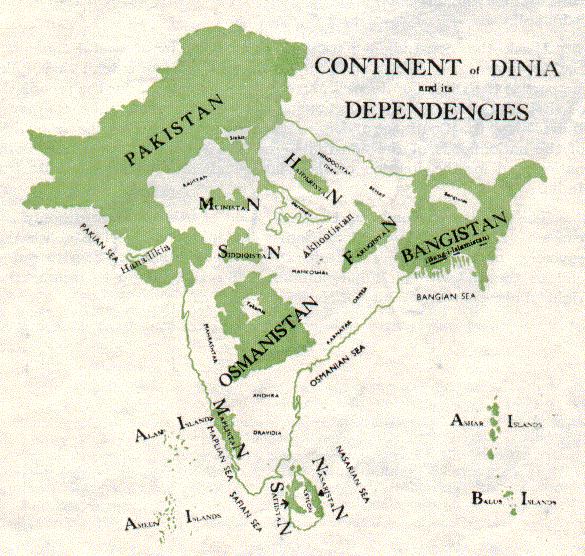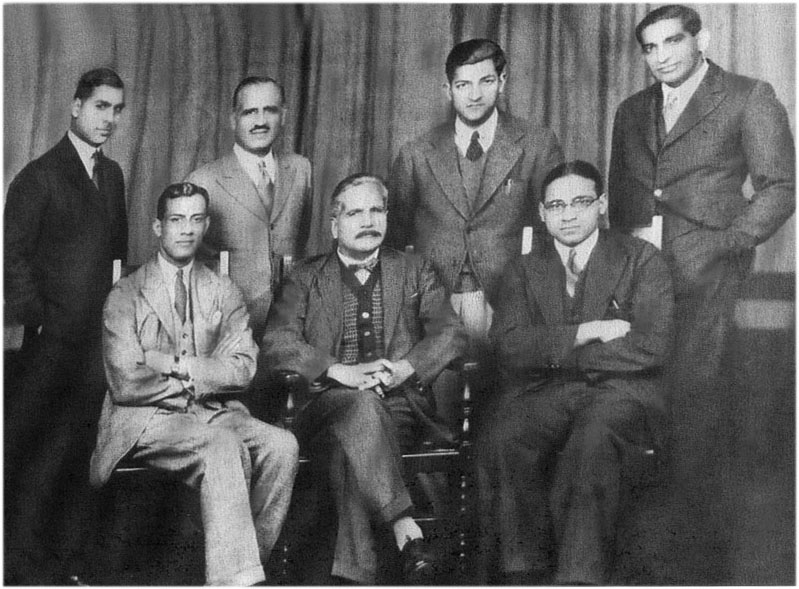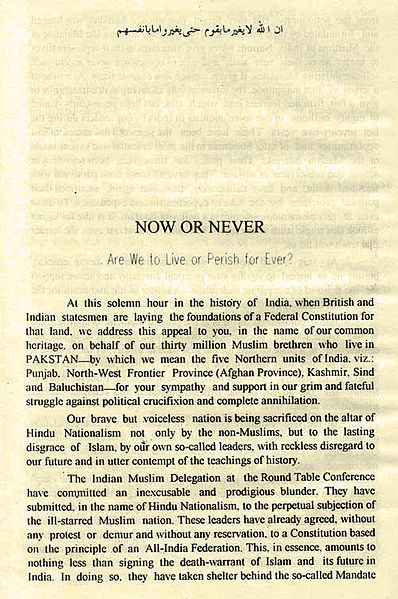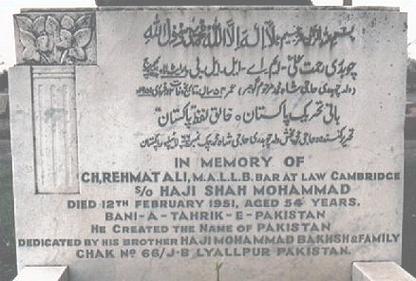<Back to Index>
- Mathematician Eugenio Beltrami, 1835
- Composer Rodolphe Kreutzer, 1766
- Pakistani Nationalist Choudhary Rahmat Ali, 1897
PAGE SPONSOR
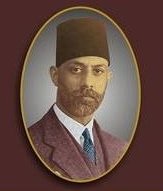
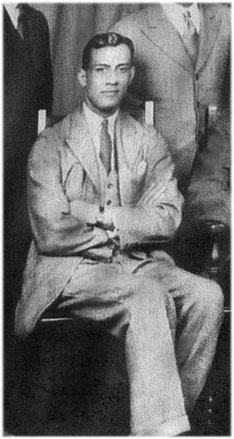
Choudhry Rahmat Ali (Urdu: چودھری رحمت علی) (November 16, 1897 – February 1951) was a Pakistani Muslim nationalist who was one of the earliest proponents of the creation of the state of Pakistan. He is credited with creating the name "Pakistan" for a separate Muslim homeland in South Asia. He propagated the Scheme of Pakistan with a missionary zeal since its inception in 1933. He also founded Pakistan National Movement to propagate his ideas. A political thinker and an idealist who wanted to save every Indian Muslim from Hindu domination, he condemned Muhammad Ali Jinnah for accepting a smaller Pakistan in 1947. In 1933, he wrote his ideas in the famous pamphlet entitled "Now or Never; Are We to Live or Perish Forever", also known as the Pakistan Declaration. The pamphlet started with this famous sentence:
| “ | At this solemn hour in the history of India, when British and Indian statesmen are laying the foundations of a Federal Constitution for that land, we address this appeal to you, in the name of our common heritage, on behalf of our thirty million Muslim brethren who live in PAKSTAN - by which we mean the five Northern units of India, Viz: Punjab, North - West Frontier Province (Afghan Province), Kashmir, Sind and Baluchistan. | ” |
Rehmat Ali was born into a Muslim Gujjar family in the town of Balachaur in Hoshiarpur District of Punjab (now Nawanshahr District), India. After graduating from Islamia Madrassa Lahore in 1918, he taught at Aitchison College Lahore before continuing Law studies at Punjab University. In 1930 he moved to England to join Emmanuel College, Cambridge, in 1931. In 1933, he published a pamphlet, Now or Never, coining the word Pakistan for the first time. In 1933, he founded Pakistan National Movement in England. Subsequently, he obtained a BA degree in 1933 and MA in 1940 from the University of Cambridge. In 1943, he was called to the Bar, Middle Temple Inn, London. Until 1947, he continued publishing various booklets about his vision of the South Asia. The independence process disillusioned him due to the mass killings and mass migrations. He was also dissatisfied with the distribution of areas among the two countries and considered it a major reason for disturbances.
Choudhry Rahmat Ali believed that the Muslims of India had to undergo a reformation politically in order to remain a viable, and independent community there. Ali noted that Hazrat Muhammad had succeeded in uniting fractured Arab tribes and that this example was to again be used by Muslims of India to pool together in order to survive in what he perceived to be an increasingly hostile India.
As such, Choudhry Rahmat Ali's writings, in addition to those of Iqbal and others were major catalysts for the formation of Pakistan. He offered "Bang - i - Islam" for a Muslim homeland in the Bengal, and "Usmanistan" for a Muslim homeland in the Deccan. He also suggested "Dinia" as a name for a South Asia for various religions.
Ali dedicated a lot of time and energy to the idea of Pakistan, and after its formation in 1947, he argued on its behalf at the United Nations over the issue of Kashmir, and the rights of Muslim minority of India.
In
1932 he moved to House no 3. on Humberstone Road, Cambridge. It was one
of the room of this house that he wrote the word PAKSTAN for the first
time. There are several accounts to the conceptualization of the name.
According to a friend (Abdul Kareem Jabbar) the name came up when Rehmat
Ali was walking along the banks of the Thames in 1932 with his friends
Pir Ahsan - ud - Din and Khawja Abdul Rahim. According to Rehmat Ali's
secretary Miss Frost, he came up with the idea of the name ‘Pakistan’
while riding on the top of a London bus.
In the early 1930s, Ali began writing about the formation of a Muslim nation in India. On January 28, 1933, he voiced his ideas in the pamphlet entitled "Now or Never; Are We to Live or Perish Forever?". The word 'Pakstan' referred to "the five Northern units of India, viz.: Punjab, North-West Frontier Province (Afghan Province), Kashmir, Sind and Baluchistan"". By the end of 1933, 'Pakistan' become common vocabulary where an i was added to ease pronunciation (as in Afghan - i - stan). In a subsequent book Rehmat Ali discussed the etymology in further detail.
- 'Pakistan' is both a Persian and an Urdu word. It is composed of letters taken from the names of all our South Asia homelands; that is, Punjab, Afghania, Kashmir, Sindh and Balochistan. It means the land of the Pure.
According to Khalid Hasan, the authorship of the name is controversial. The late Mian Abdul Haq from Sahiwal who knew Choudhry Rehmat Ali well wrote in the daily "Nadai Millat, Lahore," in June 1970 that the word Pakistan was invented by Khawaja Abdul Rahim and he obtained Allama Iqbal’s blessings for his coinage. On 21 December 1987, Rahim told a meeting at the Aiwan - e - Nawai Waqt in Rawalpindi that he it was who had invented the word Pakistan and that this name was first announced at a meeting of the Khyber Union of Students over which he was presiding".
But Professor K.K.Aziz writes that "Rahmat Ali alone drafted this declaration (in which the word Pakistan was used for the first time), but in order to make it "representative" he began to look around for people who would sign it along with him. This search did not prove easy for "so firm was the grip of 'Muslim Indian Nationalism' on our young intellectual at English universities that it took me (Rahmat Ali) more than a month to find three young men in London who ........offered to support and sign it ." Later on, his political opponents used the name of these signatories and other friends of Rahmat Ali, as creator of word 'Pakistan'.
One of the analyses of this subject was made by writer and journalist Munir Ahmed Munir and published in Nawai Waqt on 31 August 2004. He writes, “The problem with Choudhry Rehmat Ali’s admirers is that they consider him the inventor of the word ‘Pakistan’, whereas inventing a name and founding a state are two different things. He had no role to play in the creation of the state where we all live. Even the authorship of the name is controversial....... Munir writes: “In every respect, Choudhry Rehmat Ali’s Pakistan was quite different from the Quaid’s Pakistan. The Choudhry himself admitted that Jinnah’s Pakistan was not his Pakistan because there were seven or eight other imaginary and utopian ‘…stans’ linked with his. Behind the Quaid’s demand for Pakistan lay realism, statesmanship, wisdom and the 1,000 year sweep of Muslim history in India
It is better to quote Muhammad Ali Jinnah himself. In his presidential address to the All India Muslim League annual session at Delhi on 24 April 1943, he said:
| “ | I think you will bear me out that when we passed the Lahore resolution we had not used the word ‘Pakistan’.
Who gave us this word'? (Cries of “Hindus”) Let me tell you it is their
fault. They started damning this resolution on the ground that it was Pakistan.
They are really ignorant of the Muslim movement. They fathered this
word upon us. . . . You know perfectly well that Pakistan is a word
which is really foisted upon us and fathered on us by some section of
the Hindu press and also by the British press. Now our, resolution was
known for a long time as the Lahore resolution popularly known as Pakistan.
But how long are we to have this long phrase? Now I say to my Hindu and
British friends: We thank you for giving us one word. (Applause, and
cries of hear, hear.) What is the origin of the word Pakistan? It was not Muslim League or Quaid - i - Azam who coined it. Some young fellows in London, who wanted a particular part of north - west to be separated from the rest of India, coined a name in 1929 - 30, started the idea and called a zone Pakistan. They picked up the letter P for Punjab. A for Afghan, as the NWFP is known even today as Afghan, K for Kashmir. S for Sind, and Tan for Baluchistan. A name was coined. Thus, whatever may have been the meaning of this word at the time it is obvious that language of every civilized country invents new words. The word Pakistan has come to mean Lahore resolution. We wanted a word and it was foisted on us and we found it convenient to use it as a synonym for Lahore Resolution. | ” |
On Dec. 29, 1930 Sir Muammad Iqbal delivered his monumental address. He said:
| “ | I would like to see Punjab, North-West Frontier Province, Sindh and Balochistan amalgamated into a single state. Self government within the British Empire or without the British Empire, the formation of a consolidated North - West Indian Muslim state appears to me to be the final destiny of the Muslims, at least of North - West India. | ” |
It is important to note that Sir Muammad Iqbal did not use the word "Pakistan" in his address. According to some scholars, that Iqbal had not presented the idea of an autonomous Muslim State; rather he wanted a large Muslim province by amalgamating Punjab, Sindh, NWFP and Baluchistan into a big North - Western province within India. They argued that "Iqbal never pleaded for any kind of partition of the country. Rather he was an ardent proponent of a 'true' federal setup for India.... And wanted a consolidated Muslim majority within the Indian Federation".
Another Indian historian, Tara Chand.
also held that Iqbal was not thinking in terms of partition of India
but in terms of a federation of autonomous states within India. Dr.
Safdar Mehmood also fell a prey to the same misconception and in a
series of articles he asserted that in Allahabad address Iqbal proposed a
Muslim majority province within the Indian federation and not an
independent state outside the Indian Federation.
According to some scholars, "Rehmat Ali’s concept of Pakistan was nebulous, impractical and fantasy - ridden. It was to include the entire northwest of India, Kashmir, the Kathiawar peninsula, Kutch, and several enclaves deep within UP, including Delhi and Lucknow. There were to be two independent Muslim states besides Pakistan: Bangistan comprising Bengal and Assam in the east and Osmanistan in the south. These two were to form a federation with Pakistan. The 243 principalities or Rajwaras were to be divided among caste Hindus and “others” and then herded together in a ghetto called Hanoodia. As for the Sikhs, they were to be pushed into an enclave called Sikhia. Other races and religions were to inhabit an encampment by the name of Hanadika. Every non - Muslim was to remain subservient to the master race he called “The Paks”. And yes, the subcontinent was to be renamed Dinia. He did not say how he was going to bring all that about."
The British and the Indian Press vehemently criticized these two different schemes and created a confusion about the authorship of the word "Pakistan" to such an extent that even Jawaharlal Nehru had to write: ""Iqbal was one of the early advocates of Pakistan and yet he appears to have realized its inherent danger and absurdity. Edward Thompson has written that in the course of conversation, Iqbal told him that he had advocated Pakistan because of his position as President of Muslim League session, but he felt sure that it would be injurious to India as a whole and to Muslims especially."
Sir Muhammad Iqbal disapproved the scheme of Ali because there were seven or eight other imaginary and utopian "…stans" linked with this scheme. He wrote to Prof. Edward John Thompson of Oxford University, that:
| “ | You call me a protagonist of the scheme called “Pakistan”. Now Pakistan is not my scheme. (Iqbal is here, referring to Ch. Rehmat Ali's scheme of Pakistan) The one that I suggested in my address is the creation of a Muslim Province – i.e.; a province having an overwhelming population of Muslims in the North - West of India. This new province will be, according to my scheme, a part of the proposed Indian Federation. Pakistan scheme (i.e., scheme of Ch. Rahmat Ali) proposes a separate federation of Muslim Provinces directly related to England as a separate dominion. This scheme originated in Cambridge. The authors of this scheme believe that we Muslim Round Tablers have sacrificed the Muslim nation on the altar of Hindu or the so called Indian Nationalism. | ” |
Like Iqbal, Jinnah also disapproved this scheme and considered it;
| “ | as some sort of Walt Disney dreamland, if not Wellsian nightmare", and thought that "he felt the professional's contempt for the amateur's mistake of showing his hand without holding the trumps. | ” |
In 1934, Choudhry Rahmat Ali and his friends met Muhammad Ali Jinnah and appealed for his support of the Pakistan idea. He replied; "My dear boys, don’t be in a hurry; let the waters flow and they will find their own level.”
While Choudhry Rahmat Ali was a leading figure for the conception of Pakistan, he lived most of his adult life in England. He had been voicing his dissatisfaction with the creation of Pakistan ever since his arrival in Lahore on April 6, 1948. He was unhappy over a Smaller Pakistan than the one he had conceived in his 1933 pamphlet Now Or Never.
After the creation of Pakistan he returned to Pakistan in April 1948, planning to stay in this country, but he was ordered by the then Prime Minister Liaqat Ali Khan to leave the country. His belongings were confiscated, and he left empty - handed for England in October 1948.
He died in February 1951 and was buried on 20 February at
Newmarket Road Cemetery,Cambridge, UK. Emmanuel College's Master, who had been Rahmat Ali's Tutor, himself arranged the burial in Cambridge on 20 February 1951.
